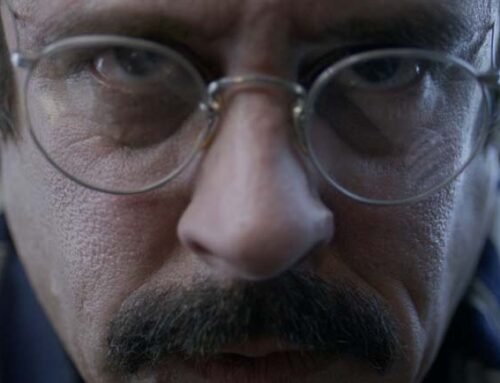Writer/director Lili Matta’s 2020 film 86 Melrose Avenue is a hostage thriller that employs moments of gut-wrenching heartache and political drama — it is also unintentionally humorous in its attempt to be so serious. Nevermind the low-production value, which can always be forgiven if there is originality and/or a clever storyline to catch the eye, however, this film falls back on, in an almost parodying manner, cliché tropes typically found in intense action thrillers, however, somehow it comes off rather slow-paced as it lingers on the drama of characters that it forces into an unwarranted place of importance in the overarching storyline.
Composed of an ensemble cast of characters with competing storylines all centered around a central, unifying event, 86 Melrose Avenue feels like an actor’s kind of movie, a bit experimental in delivery and very dialogue-heavy. The film follows a group of characters, set mostly over one shared night at an art gallery for an up-and-coming Lebanese photographer. When the evening is suddenly interrupted by a veteran of the War in Afghanistan taking them hostage in the middle of a PTSD episode, the characters manage to find common ground by discussing their personal experiences with life and death.
Though I appreciate the use of non-linear storytelling to add some interest to this viewing, I felt that the transitions between scenes were missing some signifier that would definitively show the scene had, in fact, transitioned. The scenes often ran into each other, making the story sometimes hard to follow and forcing me to ask ‘how and why did we get here?’ quite a few times. Some choices in acting performances, props, and sound effects seemed comically over-the-top and dramatic, which is unfortunate because it is clear that director Matta’s intention is very serious by the story material, which addresses the precarious relationships between cultures in the Middle East and PTSD experienced by both soldiers and victims of war.
86 Melrose Avenue makes a strong attempt at being a thriller, but the hostage situation that should be the focus and the source of the drama and thrills is sadly put on the back burner, with the drama, instead, being found in the personal lives of each character. Since the film declares itself, in its last frame, to be a social commentary piece on gun violence, it seems counterproductive to deviate from the gun violence of the hostage situation so much. As most of the characters are not main characters, their flashbacks just seem like an attempt to add minutes to the runtime. Somewhere around the fifth deviation from the hostage storyline, this method grew tiresome as each deviation represented an interruption in the pacing of a film that could have otherwise been heart-racing rather than tedious to follow.
86 Melrose Avenue dives deep into the lives of a group of strangers and dredges up their insecurities, each sharing a theme of existential crisis in their personal stories, and dealing with life and death in some fashion. 86 Melrose Avenue is a “characters study” film, with emphasis on the plurality by this movie being comprised of many, many storylines. Despite the questionable directorial choices and perhaps so-so production value of 86 Melrose Avenue, ultimately, it is a watchable movie, with its cliché-ness being comfortably familiar and its humorous over-dramatics pulling me in, albeit, for the wrong reasons.
A Generous 5.25 out of 10
| 86 Melrose Avenue | ||
| RATING: | NR |
|
| Runtime: | 1 Hr. 24 Mins. | |
| Directed By: | ||
| Written By: | ||







